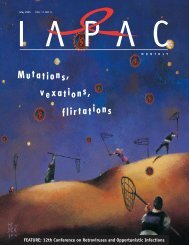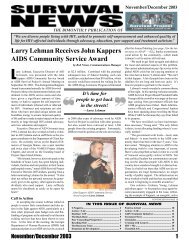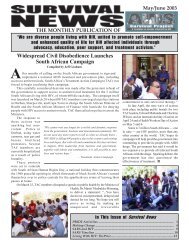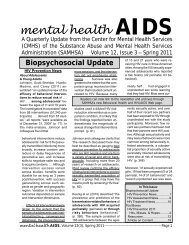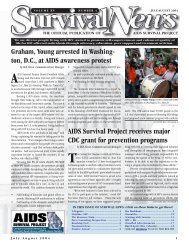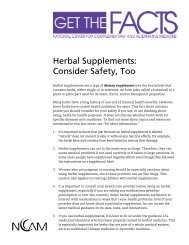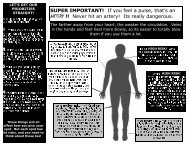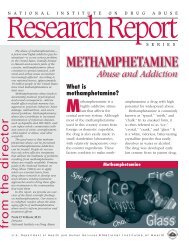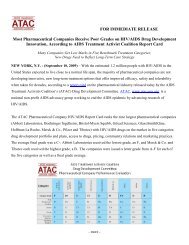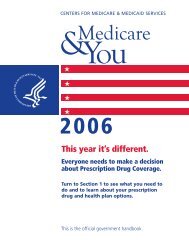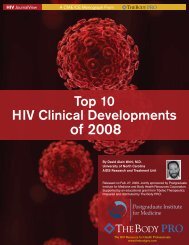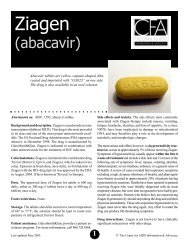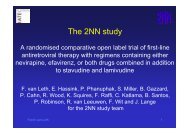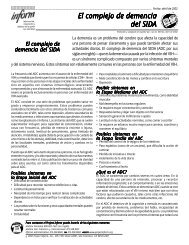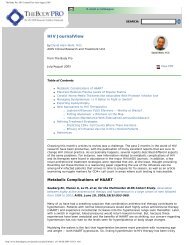here - CD8 T cells - The Body
here - CD8 T cells - The Body
here - CD8 T cells - The Body
Create successful ePaper yourself
Turn your PDF publications into a flip-book with our unique Google optimized e-Paper software.
PHOTO: CHRiS KnigHT<br />
EdITOR’S nOTE<br />
jEFF BERRY<br />
@PaEDIToR<br />
What is a woman?<br />
I’VE hAd mAnY TEAChERS In LIfE, InCLudInG WOmEn<br />
who have taught me particularly important lessons about<br />
courage, strength, resilience, caring, and compassion.<br />
Cindy, the oldest of my three sisters, realized at an<br />
early age that it was her job to help look after the other<br />
four kids in the Berry clan. My sister Barb became a<br />
veterinarian, the first doctor in our family. <strong>The</strong> one who<br />
was closest to me in age, Wendy, became my best friend<br />
growing up. My mother Norma went back to work when<br />
I started preschool in the early 1960’s, and continued<br />
working as a schoolteacher and elementary school principal<br />
until she retired. And my grandmother, Ruby, lived<br />
to be 101, and would often recount to us colorful stories<br />
from her life, such as the one about traveling all day in<br />
a covered wagon to see the Wright Brothers perform<br />
breathtaking feats in their amazing flying machines.<br />
All these women and others demonstrated to me<br />
wonderful qualities that I respected and admired, and<br />
sought to emulate and incorporate into my own sense<br />
of values and ideals. T<strong>here</strong> are countless examples in<br />
our culture of strong, courageous women and their<br />
many accomplishments and contributions to the world.<br />
So why is it that so many women who are in positions<br />
of power and leadership appear threatening to so many<br />
who live in our male-dominated society?<br />
A recurring theme at this year’s International AIDS<br />
Conference was the role of women in ending the<br />
epidemic. In her address at the conference opening<br />
plenary, Secretary of State Hillary Clinton talked about<br />
the essential role of communities, especially people living<br />
with HIV, in turning the tide on the epidemic. “And it<br />
will come as no surprise to you,” Clinton told the packed<br />
audience, “that I would like to highlight the particular<br />
role that women play.”<br />
Clinton pointed out that in Sub-Saharan Africa<br />
women account for 60% of people living with HIV.<br />
“Women want to protect themselves, and they want<br />
adequate health care, and we need to answer their call,”<br />
said Clinton. “Every woman should be able to decide<br />
when and whether to have children. This is true if she is<br />
HIV-positive or not. Women need and deserve a voice in<br />
the decisions that affect their lives.”<br />
In a lively morning plenary session by a panel made<br />
up of mostly women, HIV-positive<br />
educator and activist Linda Scruggs<br />
said it best by stating she wasn’t<br />
going to ask for anything, because<br />
women have been asking to be<br />
counted in for the last two decades. “Today I stand <strong>here</strong><br />
to give you some directions. We’ve decided to stop asking,<br />
and maybe you just need the recipe.”<br />
Scruggs called for meaningful involvement of women<br />
at every level, from the government to local communities<br />
and organizations, and also made it clear that women are<br />
not just asking for male-run organizations that “tolerate” a<br />
women’s program. “We need the support and resources…<br />
to give us the power to heal our sisters, to change our<br />
men. We are the mothers of the earth.”<br />
In her talk, Scruggs also shared part of what she says<br />
got her to the stage that day. She learned she was HIVpositive<br />
while visiting a perinatal clinic and was 13-weeks<br />
pregnant, and had to decide whether to terminate the<br />
pregnancy and live five years, or have the baby and possibly<br />
live three. She says she’s glad that day the doctor<br />
was wrong, and her son, Isaiah, was born free of HIV,<br />
and he just recently turned 21.<br />
“I could’ve made the decision to have an abortion.<br />
An abortion would not have been the first one I had had,<br />
but I had an experience with God. I had an experience<br />
that…made me really look and reflect about women.<br />
After all, what is a woman who thinks she’s ugly? What<br />
is a woman who feels she has no self-value? What is a<br />
woman who allows not one, but two men to rape her in<br />
silence? What is a woman who allows an uncle to molest<br />
her and others and still be silent?... What is a woman<br />
who feels that she’s been broken and voiceless? What is<br />
a woman who’s afraid of understanding herself? What<br />
is a woman who spent a lifetime trying to be someone<br />
other than herself?<br />
“I’ll tell you, that cold November day, that woman<br />
was me, but it was through the support of this community<br />
that I was able to find a voice and a place, that<br />
I could be just who I say I am. I am a woman.”<br />
Take care of yourself, and each other.<br />
t<strong>here</strong> are<br />
countless<br />
examples in<br />
our culture of<br />
strong, courageous<br />
women<br />
and their<br />
many accomplishments<br />
and contributions<br />
to the<br />
world. so why<br />
is it that so<br />
many women<br />
who are in<br />
positions<br />
of power<br />
and leadership<br />
appear<br />
threatening<br />
to so many<br />
who live in<br />
our maledominated<br />
society?<br />
POSiTivElyAwARE.COM SEPTEMBER+OCTOBER 2012 7



